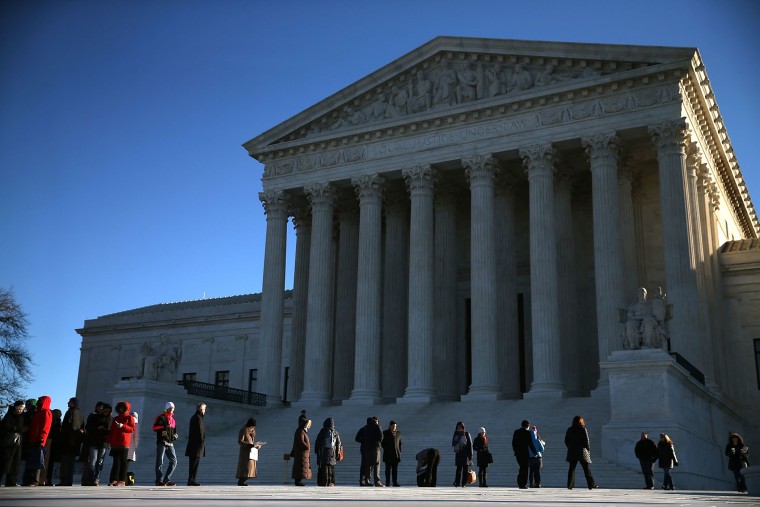By all appearances, partisan control of the U.S. Senate is very much up for grabs this year. There are 34 seats in play -- Republicans are defending 24 of those seats to the Democrats' 10 -- and Dems would retake the majority with a net gain of 5.
Obviously, when it comes to predicting the outcome of elections that are still eight months away, it's best to be cautious. Unpredictable developments will influence the outcome, and in many cases, we don't even know for certain whose names will be on the ballot.
That said, Stu Rothenberg has a good piece in Roll Call today noting that Democrats have reason to be optimistic about their chances -- especially if Donald Trump or Ted Cruz wins the GOP presidential nomination.
No, there is little hard evidence yet that a huge Democratic electoral wave has started to develop and at this point, Democratic control of the Senate is not yet inevitable. But that should not obscure the fact that a fundamental shift has occurred in the electoral cycle over the past six weeks. Up to this point, the burden of proof has been on Democrats to demonstrate that they can oust four or five Republican senators and win control of the chamber. But now, with Republicans in disarray and the party flirting with selecting a weak general election nominee, the benefit of the doubt has shifted away from the GOP and to the Democrats.
At face value, analyses like these are no doubt responsible for quite a bit of heartburn among Republican Party officials, but there's actually a more pressing problem GOP officials should consider: what this means for their dangerous Supreme Court strategy.
As of now, Senate Republicans have embraced a blockade unlike anything ever tried in American history. The GOP majority has said, repeatedly and in no uncertain terms, that Republicans will block any high court nominee, no matter who's sent to the chamber for consideration, no matter how qualified he or she might be, no matter what the consequences are for the Supreme Court itself. There will be no confirmation hearing, there will be no vote, there won't even be polite conversations in senators' offices.
But the prevailing political winds should, from a conservative perspective, force a reevaluation of this blueprint.
Obviously, we don't yet know who President Obama will nominate, but by all accounts, he'll choose a mainstream, center-left jurist -- the kind of nominee who'd face no meaningful opposition under normal political circumstances -- who's very likely already been approved to the federal bench by large and bipartisan Senate majorities.
According to the GOP plan, that nominee will face a brick wall of unyielding opposition. This calendar year will end with a 4-4 court, and the existing vacancy will be left for policymakers to tackle in 2017.
But as Republicans probably realize by now, there's a decent chance -- with odds shifting regularly in their opponents' favor -- that there will be a Democratic White House and a Democratic Senate in 2017. It's by no means certain, but responsible officials can start making educated projections.
What does this have to do with the Supreme Court? Probably everything. In the short term, Senate Republicans can accept a moderate nominee from President Obama, or they can wait for next year and face the possibility of a Democratic president and Democratic senators making this decision on their own.
This year's nominee would be chosen with GOP support in mind. Next year's nominee, in the event of Democratic victories, wouldn't need any Republican confirmation votes at all.
Sure, maybe Dems won't have as great an election year as some suspect, but how big a chance are Republicans willing to take?
Looking back over the last several years, congressional Republicans have routinely had opportunities to advance their own goals and priorities -- on immigration, health care, the environment -- shaping public policy in ways that benefit their own agenda, even while losing the larger fight, but they've been too short-sighted to take advantage.
As we discussed last year, the Republican Party's first instinct -- attack, reject, and oppose anything and everything President Obama suggests, regardless of merit -- has done GOP lawmakers no favors. Indeed, it's ultimately self-defeating, since Republicans could have produced more favorable outcomes, from their own perspective, if they'd tried to compromise a little with the White House.
Don't be too surprised if, about a year from now, GOP senator start quietly telling one another, "We probably should've accepted Obama's nominee."
